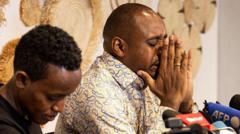Activist Boniface Mwangi revealed shocking details of sexual torture during his recent detention in Tanzania, prompting international concern and allegations of a repressive political climate under Tanzanian President Samia Suluhu Hassan. Regional rights groups and Amnesty International are demanding investigations into the treatment of Mwangi and fellow activist Agather Atuhaire.
Outrage Over Alleged Torture of Kenyan Activist in Tanzanian Detention

Outrage Over Alleged Torture of Kenyan Activist in Tanzanian Detention
Kenyan activist Boniface Mwangi's harrowing accounts of torture in Tanzania have sparked a call for international scrutiny of human rights abuses amidst rising political repression.
Article Text:
Kenyan activist Boniface Mwangi has come forward with a harrowing account of his alleged sexual torture during detention in Tanzania, expressing that he is "struggling to be alive" following his traumatic experience. Mwangi, who traveled to Tanzania to support detained opposition figure Tundu Lissu, shared graphic details of his abuse during a press conference in Nairobi, which has drawn widespread attention and calls for accountability.
In a tearful recount, Mwangi described being stripped of his clothing, beaten while hanging upside down, and subjected to sexual assault. This disturbing testimony was met with disbelief from Tanzanian police chief Jumanne Muliro, who dismissed the claims as mere "hearsay" from activists. Muliro suggested that suspected instances of abuse should be reported directly to authorities for investigation.
In the context of an increasingly repressive regime, human rights organizations, including Amnesty International, are urging transparency and accountability from Tanzanian officials following accusations against the government in lead-up to the presidential and parliamentary elections scheduled for October. Mwangi was detained alongside Ugandan activist Agather Atuhaire, who also reported being raped while in custody. Both activists have used their experiences to shine a spotlight on systemic abuses faced by those opposing the Tanzanian government.
During his recantation, Mwangi expressed his turmoil further, stating the mental anguish from his ordeal lingers on, filled with nightmares and fears for his life. "You have a lot of thoughts, and you're alone in the dark, and you're thinking you're going to get killed," he said, underscoring the psychological toll of his traumatic experience.
The activists had traveled to Tanzania to advocate for Lissu, who has been vocal against electoral practices which he views as unjust. Mwangi highlighted the absurdity of his abduction from a prominent hotel, indicating the government's blatant disregard for human rights. "It means that the Tanzanian government doesn't care about what people think about it," he remarked, indicating the gravity of their situation.
Expressions of concern have also come from the US Department of State, which has previously recognized Atuhaire for her bravery in activism. Their alarming accounts of abuse call into question the political atmosphere in East Africa and serve as a warning of escalating authoritarianism in the region.
In a bid to prevent future incidents, Mwangi desires public access to his medical records, hopeful that shedding light on such abuses can prevent them from happening again. Meanwhile, the story of both Mwangi and Atuhaire serves as a painful reminder of the struggles activists face in their fight for justice and human dignity across African nations.
Kenyan activist Boniface Mwangi has come forward with a harrowing account of his alleged sexual torture during detention in Tanzania, expressing that he is "struggling to be alive" following his traumatic experience. Mwangi, who traveled to Tanzania to support detained opposition figure Tundu Lissu, shared graphic details of his abuse during a press conference in Nairobi, which has drawn widespread attention and calls for accountability.
In a tearful recount, Mwangi described being stripped of his clothing, beaten while hanging upside down, and subjected to sexual assault. This disturbing testimony was met with disbelief from Tanzanian police chief Jumanne Muliro, who dismissed the claims as mere "hearsay" from activists. Muliro suggested that suspected instances of abuse should be reported directly to authorities for investigation.
In the context of an increasingly repressive regime, human rights organizations, including Amnesty International, are urging transparency and accountability from Tanzanian officials following accusations against the government in lead-up to the presidential and parliamentary elections scheduled for October. Mwangi was detained alongside Ugandan activist Agather Atuhaire, who also reported being raped while in custody. Both activists have used their experiences to shine a spotlight on systemic abuses faced by those opposing the Tanzanian government.
During his recantation, Mwangi expressed his turmoil further, stating the mental anguish from his ordeal lingers on, filled with nightmares and fears for his life. "You have a lot of thoughts, and you're alone in the dark, and you're thinking you're going to get killed," he said, underscoring the psychological toll of his traumatic experience.
The activists had traveled to Tanzania to advocate for Lissu, who has been vocal against electoral practices which he views as unjust. Mwangi highlighted the absurdity of his abduction from a prominent hotel, indicating the government's blatant disregard for human rights. "It means that the Tanzanian government doesn't care about what people think about it," he remarked, indicating the gravity of their situation.
Expressions of concern have also come from the US Department of State, which has previously recognized Atuhaire for her bravery in activism. Their alarming accounts of abuse call into question the political atmosphere in East Africa and serve as a warning of escalating authoritarianism in the region.
In a bid to prevent future incidents, Mwangi desires public access to his medical records, hopeful that shedding light on such abuses can prevent them from happening again. Meanwhile, the story of both Mwangi and Atuhaire serves as a painful reminder of the struggles activists face in their fight for justice and human dignity across African nations.



















